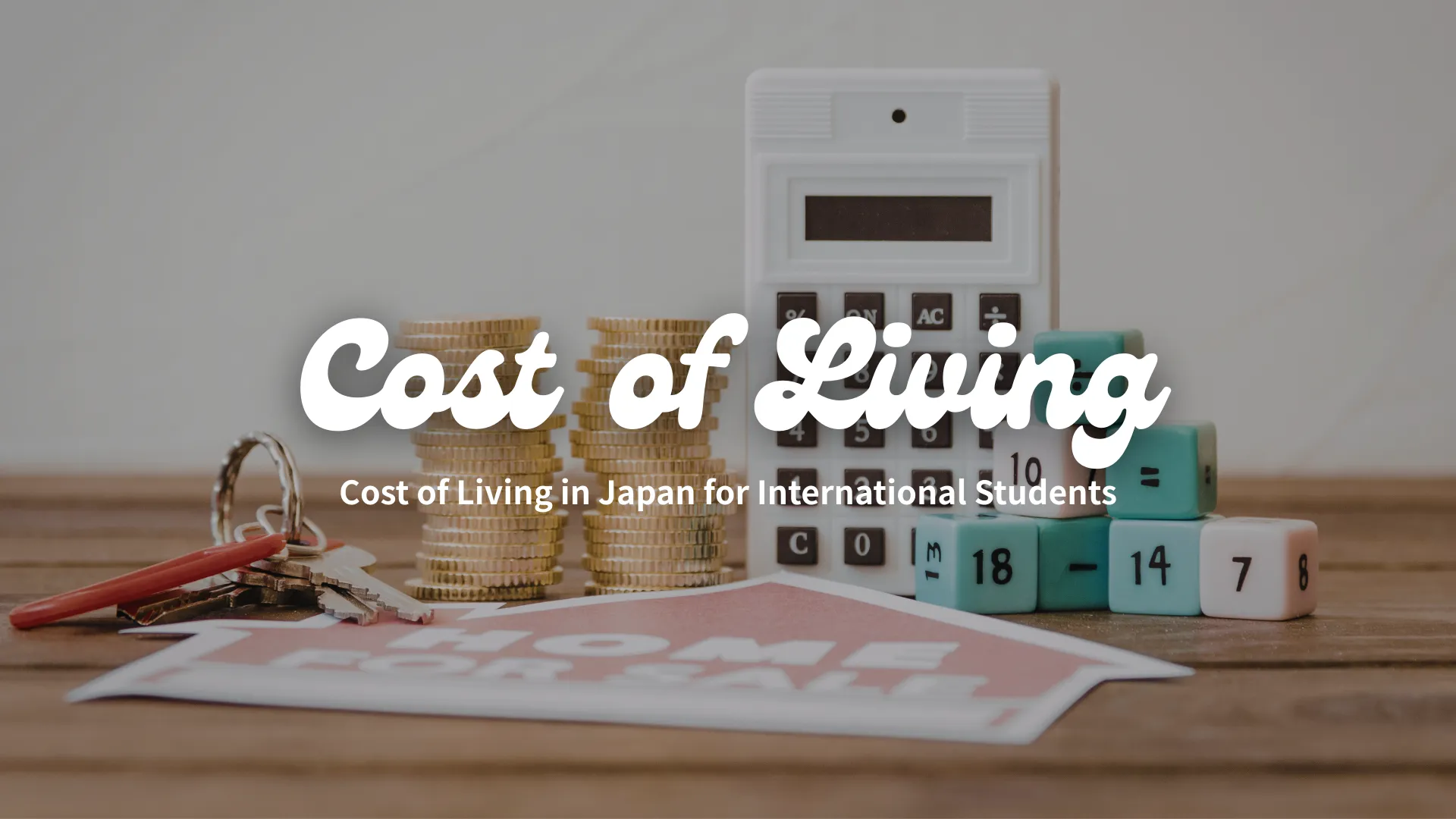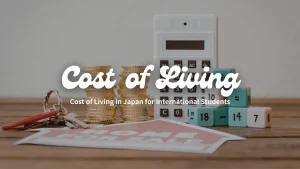Learn the cost of living in Japan for international students. Get a breakdown of rent, food, utilities, transportation, and budgeting tips to plan your stay.
Want to learn Japanese in Japan? Ask any questions!
Apply with Travelife Japan to receive personalized guidance, application support, and a smoother enrollment experience.
Overview of Monthly Expense in Japan
Sapporo offers a relatively low cost of living, especially for students, with affordable transportation. Tokyo presents the highest expenses, primarily due to steep accommodation and dining costs. Nagoya offers a moderate cost of living, balancing modernity with tradition. Kyoto provides a harmonious blend of historical richness and contemporary lifestyle. Osaka offers a slightly more affordable urban experience compared to Tokyo. Fukuoka stands out for its welcoming community and lower living costs, making it an attractive choice for students. You can also find the monthly expense for other cities in Japan in this page provided by JASSO.
- Sapporo: Monthly Expense JPY 93,000
Sapporo, the heart of Hokkaido, is renowned for its seasonal festivities and exquisite seafood, offering a unique lifestyle with relatively low living costs. Monthly expenses for students here average around JPY 93,000 for essentials, including affordable transportation at JPY 5,000. - Tokyo: Monthly Expense JPY 108,000
As Japan’s capital, Tokyo stands as the epitome of high living costs, demanding an average of JPY 108,000 monthly from international students. The bulk of this expense goes into accommodation, with student apartments ranging from JPY 50,000 to JPY 70,000. Tokyo’s vast dining scene also significantly impacts food budgets. - Nagoya: Monthly Expense JPY 82,000
Nagoya, a crucial industrial and cultural hub, balances modernity with tradition, offering a moderate cost of living for students. With monthly expenses estimated around JPY 82,000, Nagoya presents a cost-effective alternative for students seeking a dynamic urban experience without the hefty price tag of Tokyo. - Kyoto: Monthly Expense JPY 89,000
Kyoto, celebrated for its historical significance and cultural wealth, sees international students spending around JPY 89,000 each month. This cost encompasses accommodation, utilities, and food, offering a harmonious blend of traditional and contemporary lifestyles to its residents. - Osaka: Monthly Expense JPY 89,000
In Osaka, Japan’s third-largest city, students encounter a slightly more affordable cost of living than Tokyo, averaging JPY 89,000 per month. Known for its urban convenience paired with a laid-back vibe, Osaka is famed for its diverse living spaces and vibrant culinary landscape. - Fukuoka: Monthly Expense JPY 73,000
Fukuoka is quickly becoming a favorite among international students for its welcoming community and lower living costs than Tokyo. Monthly student expenses is around JPY 73,000, including around JPY 9,000 for public transportation and about JPY 25,500 for utilities, highlighting its appeal as a cost-effective educational destination.

Upfront Expenses for Studying in Japan
Tuition Fees
Tuition fees represent the most substantial portion of the cost of study for international students in Japan. Once you receive your certificate of qualification, full payment of tuition fees, averaging JPY 400,000 for six months, is mandatory before proceeding with the visa application. This payment, which must be made in full without the option for installment plans, covers solely the academic instruction, excluding additional expenses like textbooks and laboratory fees. These extra academic costs can significantly increase your yearly budget.
Bank and Income Statement
For school and student visa applications, a bank statement showing a balance between JPY 2,000,000 to 3,000,000 demonstrates financial stability to cover living expenses and tuition fees. An income statement within the same range confirms a stable income source, ensuring the ability to sustain living costs during the study period.
Flight Fare
The cost of flying to Japan varies by airline, season, and the distance from your departure country. To economize on this aspect of your expenses, it’s wise to book early and remain flexible with your travel dates. Economical ticket options can often be found by comparing different airlines and choosing off-peak times. Several websites are popular for finding and comparing flight prices to Japan, offering various options to suit different budgets and preferences. Some of these include:
Housing
Securing accommodation in Japan entails an upfront deposit known as Shikikin (敷金) and Reikin (礼金) that is equivalent to 1-2 months of rent. This deposit, in addition to the first month’s rent, is due upon lease signing, posing a significant initial expense. While some institutions provide more affordable dormitory options, the deposit is a crucial factor to consider in your overall living cost calculation when planning your study in Japan.
Furnishing
Setting up your new home in Japan might require additional expenses for basic furnishings and appliances, starting from JPY 50,000. This includes necessities such as bedding, a desk, and a microwave. Economizing by shopping at second-hand stores or online marketplaces can help lower these costs. Additional essentials like kitchenware, cleaning supplies, and personal items can further increase your initial living cost by JPY 10,000 to JPY 20,000, an important aspect to factor into your budget for studying in Japan.
Monthly Expense of Studying in Japan
Rent and Utilities
In Japan, rent constitutes the largest monthly expense for students, especially in metropolitan areas like Tokyo, where a single room in a shared apartment ranges from JPY 50,000 to JPY 70,000. More affordable options, such as university dormitories or guesthouses, are priced between JPY 30,000 and JPY 50,000. Location greatly influences rent, with costs decreasing in suburban areas or smaller cities. Utilities add JPY 8,000 to JPY 15,000 to monthly expenses, with potential increases during winter due to heating. It’s vital to check whether utilities are included in the rent.
Phone Service and Internet
Monthly budgets for phone services should account for JPY 2,000 to JPY 5,000, with variations based on data and call allowances. Internet expenses range from JPY 3,000 to JPY 6,000, depending on the provider and speed. Opting for bundled services for mobile and home internet can lead to cost savings, a smart consideration for managing the living cost and monthly expense in Japan for students.
Transportation
Public transportation is a hallmark of efficiency in Japan, necessitating a monthly budget of JPY 5,000 to JPY 10,000 for student passes, varying by city and distance. For shorter commutes, bicycles emerge as an economical and popular choice, further emphasizing the practicality of planning for monthly transportation costs as part of the overall living cost for students.
Food and Grocery
For groceries, students should anticipate spending JPY 30,000 to JPY 40,000 monthly. While dining out offers convenience, it significantly increases this budget. A mix of home-cooked meals and occasional dining out offers a financially balanced strategy, rounding the monthly food budget to about JPY 50,000. This approach aids in effectively managing the cost of study and living expenses in Japan.
Entertainment and Travel
Setting aside JPY 10,000 to JPY 30,000 monthly for entertainment and travel enables students to explore Japan’s rich cultural heritage and scenic beauty. This budget covers various activities, from movies to short excursions, offering a glimpse into effectively balancing study commitments with leisure, thereby enhancing the overall experience of living and studying in Japan while keeping an eye on monthly expenses.
Hidden Expenses for Studying in Japan
Medical Insurance
Enrolling in Japan’s National Health Insurance (NHI) system is mandatory for all residents, including international students. This scheme ensures access to comprehensive healthcare services for a monthly fee of approximately JPY 2,000 to JPY 3,000. Although it represents an additional cost, the NHI provides invaluable peace of mind by covering a substantial portion of medical expenses, making it a crucial consideration in your overall living cost and monthly expense in Japan.
Books and Learning Materials
The cost of books and learning materials often surprises students with an additional JPY 10,000 to JPY 30,000 per semester. This expense varies significantly based on the field of study, with courses in science and technology generally requiring more costly materials. Planning for this hidden cost is essential to manage your finances effectively, ensuring you can afford the necessary resources to support your studies in Japan.
Guarantor Fees
Most rental contracts in Japan necessitate a guarantor. For international students without a local guarantor, a guarantor company becomes necessary, charging a fee usually between 50% to 100% of one month’s rent. This fee adds to the initial financial burden of securing accommodation, underscoring the importance of including such costs in your living cost assessments.
Rental Agency Fees
Utilizing a rental agency to find accommodation in Japan incurs additional fees, typically equal to one month’s rent. While agencies facilitate the housing search, particularly for those abroad or with limited Japanese language skills, this cost significantly impacts the overall budget for students preparing for their study journey in Japan.
Reducing the Budget
Scholarships
In Japan, full scholarships are uncommon, with most only subsidizing a portion of tuition and living costs. It’s essential to tally all study-related expenses and devise a financial plan that leans heavily on personal savings instead of expecting full scholarship coverage. For more details, refer to the page provided by JASSO.
Securing a scholarship can significantly reduce the financial burden of studying abroad. Scholarships are offered by various entities, such as the Japanese government, private foundations, and universities, and can cover tuition, living expenses, and sometimes flight costs. Here’s a breakdown of different types of scholarships available:
- Monbukagakusho Honors Scholarship for Privately Financed International Students
Before arrival, applicants can’t apply directly but may be selected as “reservists” for some courses based on EJU results. After arriving in Japan, applications must be submitted through schools, though the number of students a school can recommend varies. - Student Exchange Support Program (Scholarship for Study in Japan under Agreement)
Initially requires enrollment in a university with a student exchange agreement. Post-arrival, students are eligible to apply through their school for support under this specific program. - Japanese Government (Monbukagakusho MEXT) Scholarship
Available for application before coming to Japan, offering a broad opportunity for international students. However, those already in Japan can also apply under certain conditions, though with possibly more restrictive criteria. - Scholarships from Local Governments, International Exchange Organizations, etc.
Typically demands the applicant to be in Japan for application, with only a few exceptions prior. The bulk of these scholarships are accessible post-arrival, encouraging applications from students already in the country or after entering an educational institution. - School Scholarships and Tuition Fee Reductions Systems
These scholarships are unique as they can be applied for both before and after enrollment, offering a flexible approach for students either planning to come to Japan or already studying there. This flexibility helps students at various stages of their academic journey.

Part-time Opportunities
Working part-time is a practical approach for international students to support themselves financially in Japan. Under a “Student” visa, you are allowed to work part-time for up to 28 hours per week during the term and full-time during vacation periods, upon receiving the necessary work permission. This not only aids in covering living expenses but also enhances your Japanese language proficiency and understanding of the local culture. It’s a valuable experience that can complement your academic pursuits and personal development in Japan.

Conclusion
The cost of living in Japan for international students can be significant, with variations depending on the city and individual lifestyle choices. Key expenses include tuition fees, accommodation, food, transportation, and personal necessities. While scholarships and opportunities for part-time employment can help alleviate financial pressures, careful budgeting is essential. Students need to plan for both essential expenses and leisure activities to fully experience life in Japan. Understanding and managing these costs effectively can enhance the educational journey, making it both enriching and enjoyable for international students.
CONTACT US
For studying Japanese in Japan, please contact us.

